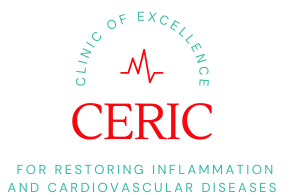Chronic inflammation is a key contributor to cardiovascular disease, yet many are unaware that the foods we eat daily can either increase or decrease inflammation in the body. At CERIC, we emphasize nutrition as one of the most powerful tools to support your heart and overall wellness. In this post, we’ll walk you through the top anti-inflammatory foods that can help reduce cardiovascular risk and boost your health naturally.
Why Inflammation Matters for Your Heart
Inflammation is the body’s response to injury or infection, but when it becomes chronic, it can lead to the development of plaque in your arteries — a process known as atherosclerosis. This buildup increases the risk of heart attacks and strokes. Thankfully, diet plays a crucial role in modulating inflammation levels and protecting your cardiovascular system.
Top Heart-Supporting Anti-Inflammatory Foods
1. Fatty Fish (Salmon, Mackerel, Sardines)
Rich in omega-3 fatty acids, these fish help reduce markers of inflammation such as CRP (C-reactive protein). Aim to consume fatty fish at least twice a week for maximum benefit.
2. Leafy Greens (Spinach, Kale, Swiss Chard)
Loaded with vitamins A, C, and K as well as antioxidants, leafy greens combat oxidative stress and inflammation. These nutrients also support healthy blood vessels.
3. Berries (Blueberries, Strawberries, Blackberries)
Berries are high in polyphenols and anthocyanins that not only reduce inflammation but also improve blood pressure and cholesterol levels — key markers for heart health.
4. Nuts (Almonds, Walnuts)
Nuts provide healthy fats, fiber, and magnesium, all of which have anti-inflammatory effects. A small handful of nuts daily is a heart-smart habit.
5. Olive Oil (Extra Virgin)
Extra virgin olive oil is a staple in the Mediterranean diet and contains oleocanthal — a compound shown to have anti-inflammatory properties similar to ibuprofen.
6. Turmeric
The active compound curcumin in turmeric is a powerful anti-inflammatory agent. Add turmeric to soups, stews, or smoothies for a daily boost.
7. Whole Grains (Quinoa, Oats, Brown Rice)
Unlike refined grains, whole grains are rich in fiber and nutrients that help regulate blood sugar and reduce inflammation over time.
Foods to Avoid
While you add anti-inflammatory foods to your plate, it’s equally important to reduce or eliminate foods that promote inflammation. These include:
- Processed meats
- Refined sugars
- Trans fats and hydrogenated oils
- Sugary beverages
- Excess alcohol
Support Through Personalized Nutrition
At CERIC, we believe in tailoring dietary guidance to each individual. Whether you’re managing inflammation, heart disease, or autoimmune conditions, our integrative approach ensures your nutrition plan works in harmony with your medical treatment.
Take the First Step
Incorporating anti-inflammatory foods into your daily diet is a sustainable way to take charge of your heart health. Start small, be consistent, and consider speaking with our team about a customized anti-inflammatory nutrition plan that fits your lifestyle.
Ready to improve your cardiovascular health through diet? Contact us today to learn how we can support your journey to wellness.

